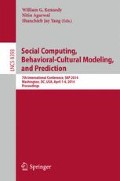Abstract
In recent times, social media sites such as Twitter have been extensively used for debating politics and public policies. These debates span millions of tweets and numerous topics of public importance. Thus, it is imperative that this vast trove of data is tapped in order to gain insights into public opinion especially on hotly contested issues such as abortion, gun reforms etc. Thus, in our work, we aim to gauge users’ stance on such topics in Twitter. We propose ReLP, a semi-supervised framework using a retweet-based label propagation algorithm coupled with a supervised classifier to identify users with differing opinions. In particular, our framework is designed such that it can be easily adopted to different domains with little human supervision while still producing excellent accuracy.
Access this chapter
Tax calculation will be finalised at checkout
Purchases are for personal use only
Preview
Unable to display preview. Download preview PDF.
References
O’Connor, B., Balasubramanyan, R., Routledge, B.R., Smith, N.A.: From tweets to polls: Linking text sentiment to public opinion time series. In: ICWSM, vol. 11, pp. 122–129 (2010)
Tumasjan, A., Sprenger, T.O., Sandner, P.G., Welpe, I.M.: Predicting elections with twitter: What 140 characters reveal about political sentiment. In: ICWSM, vol. 10, pp. 178–185 (2010)
Speriosu, M., Sudan, N., Upadhyay, S., Baldridge, J.: Twitter polarity classification with label propagation over lexical links and the follower graph. In: Proceedings of the First workshop on Unsupervised Learning in NLP, pp. 53–63. Association for Computational Linguistics (2011)
Wilson, T., Hoffmann, P., Somasundaran, S., Kessler, J., Wiebe, J., Choi, Y., Cardie, C., Riloff, E., Patwardhan, S.: Opinionfinder: A system for subjectivity analysis. In: Proceedings of HLT/EMNLP on Interactive Demonstrations, pp. 34–35. Association for Computational Linguistics (2005)
Tan, C., Lee, L., Tang, J., Jiang, L., Zhou, M., Li, P.: User-level sentiment analysis incorporating social networks. In: Proceedings of the 17th ACM SIGKDD International Conference on Knowledge Discovery and Data Mining, pp. 1397–1405. ACM (2011)
Wong, F.M.F., Tan, C.W., Sen, S., Chiang, M.: Quantifying political leaning from tweets and retweets (2013)
Go, A., Bhayani, R., Huang, L.: Twitter sentiment classification using distant supervision. CS224N Project Report, Stanford, pp. 1–12 (2009)
Davidov, D., Tsur, O., Rappoport, A.: Enhanced sentiment learning using twitter hashtags and smileys. In: Proceedings of the 23rd International Conference on Computational Linguistics: Posters, pp. 241–249. Association for Computational Linguistics (2010)
Esuli, A., Sebastiani, F.: Sentiwordnet: A publicly available lexical resource for opinion mining. In: Proceedings of LREC, vol. 6, pp. 417–422 (2006)
Pedregosa, F., Varoquaux, G., Gramfort, A., Michel, V., Thirion, B., Grisel, O., Blondel, M., Prettenhofer, P., Weiss, R., Dubourg, V., Vanderplas, J., Passos, A., Cournapeau, D., Brucher, M., Perrot, M., Duchesnay, E.: Scikit-learn: Machine learning in Python. Journal of Machine Learning Research 12, 2825–2830 (2011)
Cohen, R., Ruths, D.: Classifying political orientation on twitter: It’s not easy! In: Seventh International AAAI Conference on Weblogs and Social Media (2013)
Mustafaraj, E., Finn, S., Whitlock, C., Metaxas, P.T.: Vocal minority versus silent majority: Discovering the opionions of the long tail. In: Privacy, Security, Risk and Trust (passat), IEEE Third International Conference on Social Computing (SocialCom), pp. 103–110. IEEE (2011)
Author information
Authors and Affiliations
Editor information
Editors and Affiliations
Rights and permissions
Copyright information
© 2014 Springer International Publishing Switzerland
About this paper
Cite this paper
Rajadesingan, A., Liu, H. (2014). Identifying Users with Opposing Opinions in Twitter Debates. In: Kennedy, W.G., Agarwal, N., Yang, S.J. (eds) Social Computing, Behavioral-Cultural Modeling and Prediction. SBP 2014. Lecture Notes in Computer Science, vol 8393. Springer, Cham. https://doi.org/10.1007/978-3-319-05579-4_19
Download citation
DOI: https://doi.org/10.1007/978-3-319-05579-4_19
Publisher Name: Springer, Cham
Print ISBN: 978-3-319-05578-7
Online ISBN: 978-3-319-05579-4
eBook Packages: Computer ScienceComputer Science (R0)

